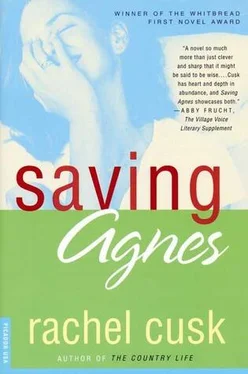My thanks go to Katie Owen at Macmillan,
Jane Bradish-Ellames at Curtis Brown,
to Billie, Mary and Sophie,
and most of all to my family.
THE house, like the party, was subsiding. It didn’t lurch or tilt Titanically, crockery and silverware crashing to the floor, women in tight taffeta dresses flung screaming across the room; like the party, it wasn’t a large-scale Hollywood affair. As yet the only evidence of its sinking was a crack, a long narrow wound in the sitting-room wall, and Agnes Day felt that it presaged a destiny altogether more menacing.
She stood at the foot of the stairs where a handful of stragglers, having not long ago heroically resisted the two o’clock exodus, now lingered with an air of having in some way been cheated. On the far side of the room, one or two people stood immobile in the landscape of bottles and ashtrays, overturned candles and shattered glass, of wine pools banked by little white hillocks of salt and fringed with crumpled cigarette packets, like contorted statues in an abstract sculpture park. She realised there was no one here she wanted to talk to, no one she could even bear talking to.
‘The condemned man ate a hearty breakfast,’ said Merlin cheerfully, passing her by as he trawled the room with a large black bin-liner.
Agnes headed for the stairs, where a candle was lying felled in a pool of its own wax on the carpet. Merlin and Nina had, rightly she now admitted, been opposed to her candle scheme; but the house had looked so lovely by candlelight, so aglow with anticipation and promise, that she had forced them to yield. Merlin had submitted gratifyingly swiftly. Nina, less pliant but always with a ready definition of democracy to hand, knew majority rule when she saw it. They had seen it as a whim, Agnes knew; a flimsy, floating thing which scientists might examine under a microscope. But if that were what it was she was full of them, riddled with terminal caprice. She toured her disease like a schizophrenic commuter, trudging back and forth between how things were and how she wanted them to be. The candles belonged to the latter world and it was a place she habitually visited alone. Roaming through the gloaming, she had almost been happy.
Agnes Day paused at the foot of the stairs. Her guests looked wild-eyed and nocturnal, something seen in a nature documentary. Some people in one corner were puncturing beer cans with ball-point pens. A geyser of brown liquid foamed over the curtains. Nina was lounging on a nearby sofa, engaged in conversation.
‘Look,’ she sighed impatiently. ‘Women don’t necessarily want men to accept their hideous physical proclivities. We need a secret life. It’s part of our autonomy. In fact, I can’t think of anything worse than some post-feminist prat fawning over my body hair.’
‘Not at all!’ cried the recipient of this lecture, apparently undeterred by it. He had something on his upper lip which, on closer inspection, Agnes saw to be a moustache. ‘You shouldn’t be embarrassed about it! In fact, I think there’s nothing more beautiful than a woman with hairy armpits.’
Nina rested her head on two fingers pointed at her temple like a revolver and rolled her eyes at Agnes, who changed course with grim determination and fled up the stairs.
In the bathroom, she peered into the mirror as if trying to see something beyond what was there. Her lipstick had seeped into spiky tendrils around her mouth, clinging like a sea-anemone to the porous surface of her face. Agnes met her own eyes and saw their expression was fearful. She rummaged in the cupboard above the sink and began to draw a new red smile over the flagging grimace already there. Halfway through, her lower lip gleaming like a bloodied crescent moon, she stopped and allowed herself to submit to a wave of despair. What was the point? How, when John had taken all point with him, packing it neatly between a sweater and a book perhaps, could she be expected to care? She looked in the mirror, hoping to compound the tragedy by reading its desolation in her face. Her orphaned lip, however, lent her grieving features an annoyingly comical aspect. She deferred further rumination while carefully drawing in the upper bow.
She emerged a few minutes later to harvest the fruit of her labours. Someone was standing outside, someone she hadn’t seen before. The light from the bathroom swung interrogatively over his face as she opened the door and barrelled straight into him, and she saw that look in his eyes as he saw her, the look of surprised appreciation, of suggestion and intent, that speaking glance she had sometimes felt she would do anything for, just to feel again its comforting implication of desire. She apologised and smiled, and somehow a conversation was begun. The slightly distasteful fact that they had met outside the bathroom could be seen as rather humorous, she thought, if presented in the right way. She planned it as she saw him taking every cue faultlessly, like a professional. This is how we met, she would say.
AGNES and Nina and Merlin met at university; or at least that was what Agnes said. Merlin, prizing information over intrigue, said they met at Oxford. Nina said they met at college. Agnes preferred her own version of events, although not, as might have been imagined, for its lack of bias towards cultural élitism in either quarter. To her, such ellipses contained a world of social possibility which could not be overlooked. So, ‘We met at university,’ she would say; or, of some fleeting stranger waving to her across a crowded room, ‘Oh, just someone I knew at university.’ ‘When I was at university ,’ she would say, eyes modestly lowered, head tilted slightly forwards, so that her panicked and prurient companion would endure several agonising moments of uncertainty. Was it Hull or Harvard? He (for it was invariably a he) couldn’t tell, but now that she’d mentioned it he simply had to know. Was she beautiful and brainy? Was his cup about to run over? Almost unable to bear the possibility of disappointment, and unaware that his discomfort was standard procedure, he would somehow stammer: ‘Where did you study?’ Agnes, with a now quite confident show of shame and humility would murmur, ‘Oxford’ — low, but not so low as to be in any danger of being misheard — and then would look for a brief moment imploringly into her inquisitor’s eye.
Once or twice, when Agnes had left the irresistible bait of her undisclosed place of education hanging tantalisingly in the air, her companion had merely smiled slyly and inquired, ‘Oxford or Cambridge?’ The admission would take on a very different tone then, and while Agnes was quick to condemn these specimens as offenders against the rules of attraction, she would eventually concede that they must also be the unfortunate living examples of that breed she had often heard spoken about — but whose aversion she had humbly never considered would devolve upon her — who disliked intelligent women.
While none of them, then, could agree on where they met, the plain fact of their mutual liking was less open to dispute. Nina and Agnes had been friends first, and had met in the early weeks of their first year. Nina, freshly emerged from the dustcloud of a genteel Surrey upbringing, was a radical supporter of anything which promised to undermine it; while Agnes naturally gravitated towards things which bore at least a resemblance, however vague, to the small collection of known quantities accumulated during her East Anglian youth. In the event their unlikely convergence was precipitated by Nina’s accosting Agnes in a hallway and inviting her to a women’s group meeting.
Читать дальше












